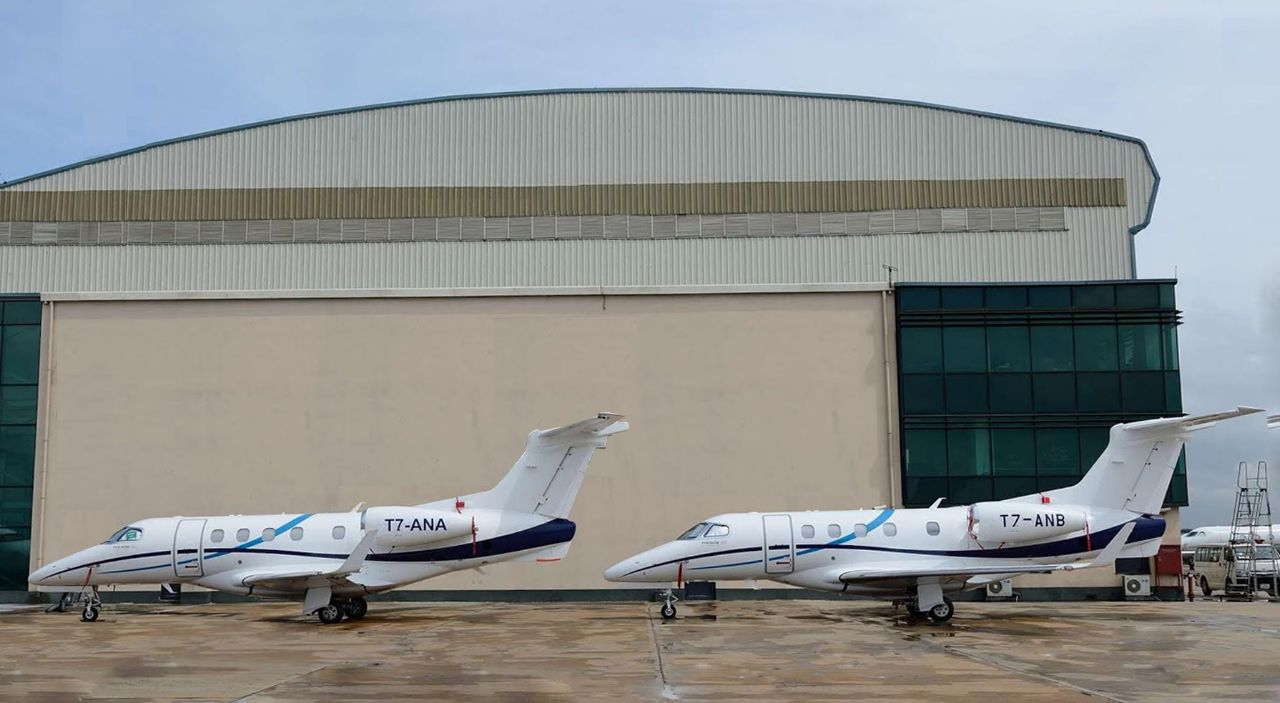Business Aviation has a terrible reputation in West Africa. Unfortunately, private jets are still seen in the region as expensive toys for playboy millionaires, insensitive and wasteful Heads of States/Senior Government Officials or politicians and others who acquired their wealth through questionable means. And yet it need not be so.
Private Jets can be and are indeed an indispensable and efficient tool for big business in a West Africa region where efficient travel between neighbouring capital cities can still be a nightmare because many of our airlines are seriously challenged. Traffic between many of the smaller urban centres is not large enough to support regular scheduled services. For instance, 3 flights a week between Lagos and Freetown means that, to attend a 3- hour Tuesday morning meeting in Freetown, a Nigerian business delegation may have to depart Lagos on Saturday morning and only get back home on Thursday afternoon. Even travel between capitals of two neighbouring countries e.g. Abuja and Yaoundé remains a daunting task in 2017. As a general rule, commercial flights are only available to and from major hubs. Point-to-point travel, which bypasses hubs, is therefore only possible in West Africa via business aviation.
ANAP Business Jets Limited is on a mission to correct the narrative surrounding business aviation in West Africa and, so far, we are succeeding. Serious business people are surprised when they discover that, by embracing the fundamentals behind a “sharing economy”, a modest financial outlay through the ANAP Jets Fractional Ownership platform can significantly transform their businesses by giving them access to a private jet “on demand” for a few years. This helps to eradicate their regional travelling headaches in a most efficient manner.
For business aviation, the watchword for these products which embrace the sharing economy is: PAY LESS & FLY MORE.
Advertisement
The alternative description is: FLY SMART.
The first time I realised that private jets had become an essential or indispensable business tool in our region was when I had a series of meetings with successful mining companies in Western Australia some years ago. I was trying to sell them the West African mining story. Miners typically bring out large maps and when you discuss specific mineral deposits with them, their first question is:- “where is the nearest airport or airstrip” from that location?
The bottom line is that, in the 21st Century, senior executives of successful mining companies (and other large businesses) are only largely interested in destinations that they can fly into and out of efficiently to explore opportunities. Because they are realists, they do not expect to find quality airlines to fly them to the hinterland. They expect to fly into a regional hub like Lagos, Abuja, Accra or Abidjan on a commercial airline and to transfer efficiently unto a 6-seater or 10 or 13-seater private jet or turboprop that will get them within no more than a one hour car-drive from their destination.
Advertisement
Airports and airstrips are therefore vital towards opening up the hinterland. Viewed from this perspective, the Presidents or Governors who insist on developing modest airstrips in the hinterland should not be vilified because business aviation should/could be the forerunner that eventually leads to significant investment activity in their undeveloped backyard.
In most parts of West Africa, there are large distances between urban centres. The days of Mungo Park spending months sailing up the River Niger are long gone. Businessmen want to finish their journey within a region inside one or two hours and only air travel can achieve that over long distances. Security concerns have also helped to create that mindset. Indeed, it might be pertinent to remember that, even Mungo Park never lived to tell us about his last journey up the River Niger. Today, nternational businessmen and big businesses in general will no longer agree to travel very long distances by road in undeveloped parts of West Africa because long distance road travel is just too risky and is also time consuming.
There is a chicken and egg situation with provincial airports and airstrips in the sense that if you do not build them, nobody will come, but then an excuse for not building them also is that there is no guarantee that anybody will come just because you built them.
Government policy on aviation should therefore be futuristic. We should not kid ourselves that the hinterland will open up itself. That may not happen or it may happen too slowly. Provincial airports and airstrips can be built very modestly and are relatively cheap to build in areas that have natural flat grasslands and that is true for large parts of West Africa. Airports and airstrips are a lot more expensive in swampy and/or hilly terrain.
Advertisement
The natural order/sequence of development of the hinterland would entail:- 1)Airports/airstrips first, followed by 2) Business aviation and then; 3) Sustainable commercial airlines. Note that commercial airlines come last in the sequence. If they rush in too early, commercial airlines will fail because they will be flying with lots of empty seats. In many provincial locations therefore, business aviation will hold sway for a while.
I have already mentioned earlier that safety should be the number one goal. According to the ICAO Safety Report 2014, Africa had approximately 2% of global air traffic in 2014 and yet our share of global aviation accidents in that same year was 10%. Another way to present these statistics is to point out that Africa’s accident rate was 12.9 per million departures, whereas the global average was 2.8 accidents per million departures. There is no excuse for that. We (Africa) can and should be as safety conscious as the rest of the world. We should have safe airports, safe skies, safe aircrafts etc. Our accident rate need not be above the world average. Indeed, Africa’s accident rate can znd should be in line with the world average – and this goal is achievable in less than a decade. After all, we do not encounter snowstorms, icy runways, amongst several other hazards that exist elsewhere.
Embracing safety as a priority goal sounds so simple and yet we have had some past Aviation Ministers in the region that only embraced safety, as a priority, after their country suffered some horrific air crashes that were clearly avoidable. If you ask West Africans to choose between safe skies and national carriers, they will choose safe skies first. Our Aviation Ministers should constantly ask questions about the surface conditions of all our runways, the quality of lighting (runways and taxiways), quality of communications between air traffic control and the pilots they are directing etc. We want to get to a position where we can say that we should never have an aviation accident anywhere in our region caused by these avoidable factors. Are we there yet? Sadly we are not there yet, but with a little more application and focus, we could be our way there.
Many people in our region wrongly equate private jets with safety and regional airlines with high risk. This need not be so and the correlation is not that straight forward. It is the operator and the premium that he places on safety and the good practices that he adopts that makes the difference. A bad operator can therefore run a risky private jet business.
Advertisement
It is for our Aviation Ministers to ask the hard questions and help initiate and coordinate policies that will get West African aviation to global safety standards. Priority attention must be given to expanding existing airports and equipping them properly with terminals and other facilities to keep pace with growing passenger traffic whilst also building new airports and airstrips to open up the hinterland.
Aviation is the preferred mode of travel for long distance travel in the future. Sadly, the pursuit of ill-advised and grandiose national carrier projects in the past, made us take our eyes off the safety ball. Fewer and fewer countries around the world care about a national carrier. Successive European countries have given up on the old-fashioned national carrier model. Most African countries have also jettisoned the idea. West African countries should not lose energy trying to repeat failed experiments from past years. Instead we should embrace “safety” as the watchword and the call to action in aviation.
Advertisement
Business Aviation means different things to different people. The old fashioned idea of owning your own aircraft and trying to manage it yourself is fast falling out of favour. In the same way that many of us use Uber in various foreign cities rather than seeking to own cars in multiple locations, Fractional Ownership, Jet Cards and Charter Services (all provided by ANAP Jets), are smarter ways to fly. Governments too should be encouraged to embrace the shared economy model. Tying down state resources in an aircraft or fleet that hardly flies is wasteful, uneconomical and largely unaffordable.
Owning your own jet leaves you vulnerable to uncapped bills. Meanwhile, all the business aviation products that companies like ANAP JETS offer enable you to ascertain and cap your costs. You decide how much you want to spend and we tell you how long or how far you can fly. There are no surprises because we take large chunks of the equity and ownership risks away from even our Fractional Owners.
Advertisement
If you want to be seen above the clouds then it is also best to be seen to fly smart by capping your costs and transferring virtually all the ownership risks to companies like ANAP Jets. Done properly, business aviation in West Africa can and should be hassle-free, more efficient, private, convenient and flexible. Modern companies like ANAP Jets are there to alleviate the ownership burden and replace it with a fixed fee, convenience and reliability.
Finally, it is good to remember that business aviation has a positive social impact. The airlines in the region are not able to absorb all the indigenous pilots and engineers. Two pilots are deployed to fly a 7-seater Embraer Phenom 300 aircraft by ANAP Jets. This is the same number of pilots that are deployed on the largest commercial airliners with 500 seats. In a sense therefore, business aviation is more labour intensive and so it contributes significantly towards reducing unemployment amongst highly skilled pilots and engineers in the West African region.
Advertisement
Peterside is the chairman of ANAP Business Jets Limited
Views expressed by contributors are strictly personal and not of TheCable.
Add a comment







